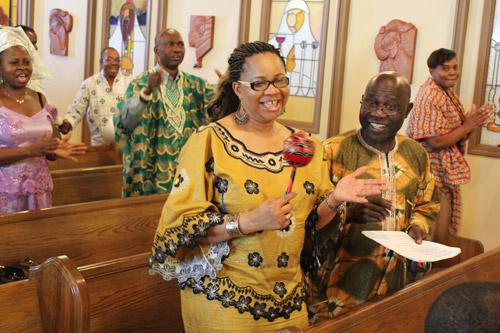
Josephine Wakwe peered at the digital camera screen and upon seeing the image of herself — arms flung wide to embrace a fellow parishioner during the sign of peace — tipped back her head and let go peals of full, round laughter.
“It looks like I’m having a good time!” she squealed, as others around her shared in her merriment.
While the appropriate term in any language is to “celebrate” Mass, few live up to a literal translation of the word quite like the Igbo Mass, which occurs the third Sunday of the month at St. Augustine Church in North Little Rock. Equal parts religious worship and cultural expression, the Igbo Mass oozes joyous fervor in a swirl of color and sound.
“We believe in singing and being in a joyful mood in our singing and dancing,” said celebrant Father Innocent Okore. “We believe the Mass is a time to be joyful and we are dancing for being in the presence of the Lord.”
Igbo (pronounced EE-boo), is both a Nigerian tribe and its language. Estimated to number about 30 million there, the Igbo are the third largest ethnic group in their home nation and the most heavily Christian.
Currently, there are 19 African priests in the diocese. The Igbo Mass was started in 2010 by Father Bartholomew Okere, then pastor of St. Augustine. Father Okore took over the Mass in 2012 when Father Okere was reassigned to hospital chaplaincy in Tennessee.
There are an estimated 200 families of Igbo descent in Central Arkansas, according to John Ekeanyanwu, vice president of the Diocesan Council of Black Catholics and parishioner of Our Lady of Good Counsel Church in Little Rock, who came to the United States from Nigeria in 1982.
While the North Little Rock Mass is the one regularly scheduled liturgy, the Igbo community finds other occasions to get together such as weddings, funerals and baptisms. Ekeanyanwu said the opportunity for parishioners to honor a cultural as well as religious heritage sets the Diocese of Little Rock apart.
“I think it’s great,” Ekeanyanwu said. “Some immigrants and especially their parents don’t speak English and it gives them an avenue to hear Mass in their own language and to understand what is going on.”
The Mass filled St. Augustine, about half dressed in native garb. Women wore brightly patterned dresses and gele, or headwraps. Several men in the congregation wore buba, a loose fitting shirt and coordinating sokoto or slacks, in vibrant colors and patterns.
Nearly all of the Mass was sung — a cappella, save for the occasional maraca and tambourine — by Father Okore or by a chorus of Igbo-speaking parishioners or both. In deference to non-Igbo-speaking guests, including several members of St. Mary Church in Hot Springs where Father Okore is on his second assignment as pastor, the readings were bilingual and the homily was in English.
The St. Mary parishioners had seen the Igbo influence firsthand as several of the North Little Rock parishioners participated in Father Okore’s 20th anniversary Mass in September.
During presentation of gifts, most parishioners got up and congregated at the back of the church, then processed up the aisle, dancing to recorded African music. In their arms were traditional gifts of groceries in addition to the Communion bread and wine. Placing them at the foot of the altar, they returned to their seats singing, heads tossing, arms and hips swaying, hands bobbing in the air in time to throbbing rhythms.
At the sign of peace, parishioners again broke ranks — led by their pastor — and strode from pew to pew embracing every friend and stranger they could reach in a show of Christian love and unity.
Ekeanyanwu said while the festive display was, in fact, true to cultural tradition, it wasn’t the only way Mass is celebrated in Nigeria. Just like in the United States, the tone leans somber or celebratory largely according to the pastor.
“When it’s the offertory, that’s when folks express themselves joyfully, thankful for seeing another Sunday and giving cheerfully from what they have been given,” he said. “But, when it comes to Communion, it’s very solemn, the ultimate respect and reverence, reflecting on how Christ died for us.”
After Mass, visitors were fed and invited to return, especially for the Dec. 15 Mass.
“It’s very encouraging to be in a diocese where everybody is welcome,” Ekeanyanwu said. “The Catholic faith is celebrated in the same way, the wording is exactly the same, only the language is different. It’s the true definition of the universal Church.”
Please read our Comments Policy before posting.
Article comments powered by Disqus Planned Parenthood’s report shows increase in abortions
Planned Parenthood’s report shows increase in abortions
 Studio 3:16 offers new approach to teaching religion
Studio 3:16 offers new approach to teaching religion
 After three decades, NLR principal plans to retire
After three decades, NLR principal plans to retire
 CHS athlete overcomes odds to reach collegiate goal
CHS athlete overcomes odds to reach collegiate goal
 John Calipari: UA basketball coach and devout Catholic
John Calipari: UA basketball coach and devout Catholic
 St. Joseph a model of solidarity with immigrants
St. Joseph a model of solidarity with immigrants
 Two gifts after Jesus’ death: Virgin Mary and Eucharist
Two gifts after Jesus’ death: Virgin Mary and Eucharist
 Why we have an altar, and not just a communion table
Why we have an altar, and not just a communion table
 Pope: Wars should be resolved through nonviolence
Pope: Wars should be resolved through nonviolence
 Living relationship with Jesus Christ in the Eucharist
Living relationship with Jesus Christ in the Eucharist